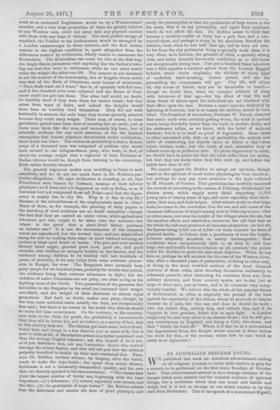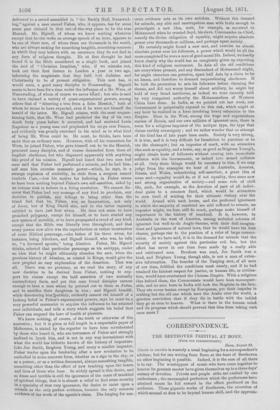AN AUSTRALIAN BRIGHAM YOUNG.
W E published last week an American advertisement calling
on all religious journals to Waite their readers to pray for a miracle to be performed on the first three Sundays of October next. That advertisement seemed to us a strange instance of the hunger which some natures feel for material evidence of spiritual things, for a revelation which they can touch and handle and weigh, but it is not so strange as one which reaches us by this mail from Melbourne. This is the speech of a man named Bignell,
delivered to a crowd assembled in " the Barkly Hall, Nunawad- ing," against a man named Fisher, who, it appears, has for some years past claimed in that out-of-the-way place to be the true Messiah. Mr. Bignell, of whom we know nothing whatever except that he can make an average speech of an hour, appears to be one of those men, of whom there are thousands in the world, who are always seeking for something tangible, something concrete in which they may believe with an assurance they do not find in any form of religious thought. He at first thought he had found it in the Bible considered as a single book, and joined the sect of " Christian Israelites," who, if we mistake not, took out their first licence in London a year or two ago, informing the magistrate that they held both Judaism and Christianity to be of present obligation. This sect has, it would seem, a good many disciples in Nunawading. Bignell seems to have been for a time under the influence of a Mr. Wroo, of Nunawading, of whom of course we never heard; but who is said to have claimed a variety of quasi-supernatural powers, among others that of "detecting a true from a false Messiah," both of whom he seems to have expected, even if he were not himself the herald of the latter. Mr. Bignell relates, with the most unques- tioning faith, that Mr. Wroe had predicted the day of his own death forty years before it occurred, and had anointed Louis Napoleon as a young man and prophesied his rei gn over France, and evidently was greatly exercised in his mind as to what kind of being Mr. Wroe could be. He must, he thinks, have been more than an ordinary man. However, with all his veneration for Wroe, he joined Fisher, who gave himself out to be the Messiah, procured many disciples, and of course demanded from them all implicit obedience, but who dispensed apparently with anything like proof of his mission. Bignell had heard that two men had once said that Fisher had performed a miracle, and he had him, self seen him exercise mesmeric power—which, he says, in a strange explosion of credulity, he stole from a surgeon named Guthrie Carr,—but his motive for believing in Fisher seems to have been nothing beyond Fisher's own self-assertion, aided by an intense wish to believe in a living revelation. We cannot dis- cover that Fisher had any message of any kind to proclaim, any doctrine to publish, any tidings to bring other than the blank fact that he, Fisher, was an Incarnation, not only of Jesus, but of King David also, and in the latter capacity entitled to have just four wives. He does not seem to have preached polygamy, except for himself, or to have started any new system of morality, or to have propagated a creed of any kind, except that the Bible was literally true throughout, and that every person now alive was the reproduction or rather incarnation of seine Biblical personage,—the father of his three wives, for instance, being Abraham, and Bignell himself, who was, he tells us, "a favoured apostle," being Absalom. Fisher, Mr. Bignell thinks, selected that particular personage as his antitype, under an idea that he might ultimately abandon the sect, when the previous history of Absalom, as related in Kings, would give the new prophet an easy explanation of the desertion. That was all. There was no pretence, as we read the story, of any new doctrine to be derived from Fisher, nothing to sup- port his claims except the bold assertion of two mutually contradictory facts, and yet this man found disciples earnest enough to beat a man whom he pointed out to them as Judas, and to sacrifice their daughters to him ; and Bignell
while denouncing himbublicly, evidently cannot rid himself of a lurking belief in Fisher's supernatural powers, says he must be a very powerful mesmerist to acquire the influence he has attained over individuals, and tells a story which suggests his belief that Fisher can suspend the laws of health at pleasure.
We know nothing, of course, of the truth or otherwise of this narrative ; but it is given at full length in a respectable paper of Melbourne, is stated by the reporter to have been corroborated by those who heard it, who are townsmen of Fisher and strongly inclined to lynch him, and is not in any way inconsistent with what the world has hitherto known of the history of imposture. Like Joe Smith, Brigham Young, and many a smaller impostor, Fisher trades upon the hankering after a new revelation to be embodied in some concrete form, whether as a sign in the sky, or as a person, or as a written document, always something tangible, something other than the effect of new teaching upon the hearts and lives of those who hear. So widely spread is this desire, and BO dense and terrible is still the ignorance of the mass of mankind of spiritual things, that it is almost a relief to find some security laa specialty of that very ignorance, the desire to insist upon a miracle as the only perfect evidence, because the only concrete evidence of the truth of the apostle's claim. The longing for con-
crete evidence acts as its own antidote. Without this demand for miracle, any able and unscrupulous man with bfain enough to promulgate a new idea, such, for example, as occurred to Mohammed when he created Seyd, his slave, Commander-iu-Chief, namely the divine obligation of equality, might acquire absolute+ power over thousands or millions, and perhaps upset society.
He certainly might found a new sect, and exercise an almost absolute power over his followers, a power which would be all the more complete if he were a man of good moral life. Indeed, we hardly know clearly why the world has so completely given up expecting this kind of religious movement. In Asia all the old conditions are everywhere present, and any descendant of Mohammed might, for aught observers can perceive, upset half Asia by a claim to be an Imam, and therefore to demand unquestioning obedience. If he took the precaution to arm his followers before claiming the throne, and did not worry himself about artillery, he might lay hold of very broad territories, as indeed we were recently told by very competent authority the Mohammedans of Western China have done. In India, as we pointed odt last week, our Government is perpetually exposed to this risk, which might at any hour be realized in a form involving heavy calamities to the Empire. Even in the West, among the huge and superstitious masses of Russia, and our own millions of ignorant men, there is room for a religious impostor of the antique type, the type that claims earthly sovereignty ; and we rather wonder that no attempt of the kind has of late years been made. Society is very strong, it is true, and it is very difficult for fanaticism to purchase or to. use the chassepot ; but an impostor of mark, with an attractive idea such as equality, and a brain, say, as good as Brigham Young's,. might obtain hosts of followers without coining into immediate. collision with the Government, or indeed into armed collision at all. Only three things would be necessary to him, if we may judge from the examples we bear of in Australia, America, Russia, and Wales, unhesitating self-assertion, a great idea of some sort—equality would do, or if not equality, then some new and strong organization of society—and some rule of civil life, such, for example, as the devotion of part of all indivi- dual gains to a common fund, which would be attractive- to men tired of waiting for their ultimate victory over the world. Armed with such levers, and the profound ignorance• in which the majority of mankind are still suffered to remain, an impostor might, we fear, still do much, perhaps make himself of importance to the history of mankind. It is, however, in Australia or the west of America, among secluded colonies of ignorant but well-to-do Anglo-Saxons, with their dull imagina- tions and ignorance of natural laws, that he would have his best chance, perhaps rise to the position of a ruler of large commu- nities. As we have said, it is in the demand for miracle that the security of society against this particular evil lies, but the effort has never in our time been made by a really able and cultivated man. Brothers was mad, Joe Smith was a. bind, and Brigham Young, though able, is not a man of exten- sive information. The founder of the Taeping sect, of all men of our time, fulfilled the conditions most nearly, and if he had retained the faintest respect for justice, or human life, or civiliza- tion, would have overturned the Chinese Empire. With a religious, idea behind them, the Communists would have been unconquer- able, and no men born in India will look the Moplahs in the face, They are never beaten except by Europeans, yet their impulse is nothing but the old one which sent the Arabs over the world, a genuine conviction that if they die in battle with the infidel they go at once to heaven. What is there in the human mind and its progress which should prevent that idea from taking root, once more ?































 Previous page
Previous page